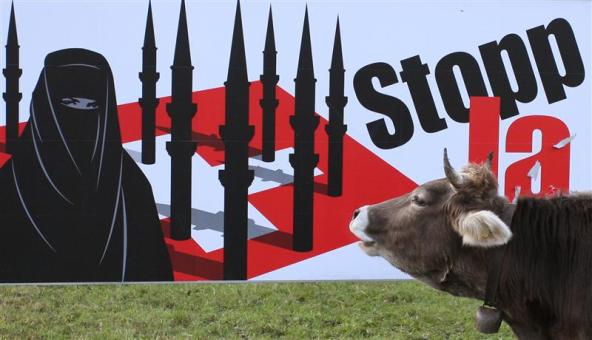Ashley Baxstrom: The Swiss upper house on Monday buried a motion to ban the burqa, which had passed the lower house in September of 2011 by a margin of 101 to 77.
The proposal, dubbed “Down with masks,” could have eventually banned full-face veils including the Muslim burqa from public transportation or government buildings. Proposed by SVP (Swiss People’s Party) representative Oskar Freysinger – of the same party that lead a 2009 campaign to prevent the construction of new minarets – the ban followed similar movements in France, the Netherlands and Belgium, countries which have banned veils or are considering such measures.
Freysinger has said in his proposal that the ban would improve public security, but a statement on the Islamic Central Council of Switzerland’s website argued that such a ban was discrimination against a religious group. Furthermore, they argued, it would have a negative affect on the Swiss tourist industry by preventing women from the Gulf from taking the train; Lake Geneva is a popular destination for wealth.
The Swiss government had recommended in May that the legislature reject the proposal, citing existing legislation that it claimed provided security contingents involving veiled persons. It also said it was the responsibility of the Swiss cantons (the 26 member states of the nation) to “make sure Switzerland’s culture of dealing with others without covering one’s face was respected in public places.”
In the decision to bury the motion, Justice Minister Simonetta Sommaruga argued that it was an insignificant problem, stating no more than 100-150 women nationwide – and most of them tourists – wear the burqa publicly.
Notably missing from the dismissal, amid the deliberations on necessity and security, is any discussion of possible religious discrimination, a matter being openly debated in nearby Belgium. There the Danish Centre for Equal Opportunities and Opposition to Racism is trying to take the store Hema to court after an employee says she was fired for wearing a Muslim headscarf.
The store in Tongeren stated that after receiving complaints about the employee’s attire (which she began wearing after converting to Islam), they decided not to continue hiring her through a temping agency. The Centre filed a complaint in the town’s labour court, and are trying to clarify in the system whether such action is legal.
Centre head Jozef De Witte stated, “We notice that more and more firms are saying that they want to remain neutral and are using this as an argument to ban staff from wearing a headscarf.”
“Neutral,” in the eyes of these people, apparently means “removed.” If we don’t have to look at it, it’s not there, and we don’t have to debate it. Except banning the physical expression of one form of faith is hardly a neutral act.
… And in other news, the Delegation of the United States of America to the UN Human Rights Council today issued a statement entitled “Right to Freedom of Religion or Belief is the Birthright of All People.” To highlight one paragraph:
The right to freedom of religion or belief is the birthright of all people, regardless of their faith or lack thereof. It includes the right to profess, practice, and teach one’s beliefs. This right must be respected and protected by all governments. Societies that do are more stable, secure, and prosperous than those that do not. The United States is committed to promoting and protecting this fundamental freedom at home and abroad, and we continue to work with the international community toward that goal. [emphasis mine]
Aside from starting an argument over whether these rights area actually fundamental or whether they are ideas we as humans have generally agreed upon and decided are a good thing to uphold, it’s always fun to hear statements about “protecting and promoting… at home and abroad” from a country currently seeing multiple instances of so-called “Anti-Sharia” bills being debated in state legislatures (like this current measure in Florida) and running headlines over whether voters will accept a Mormon president.

